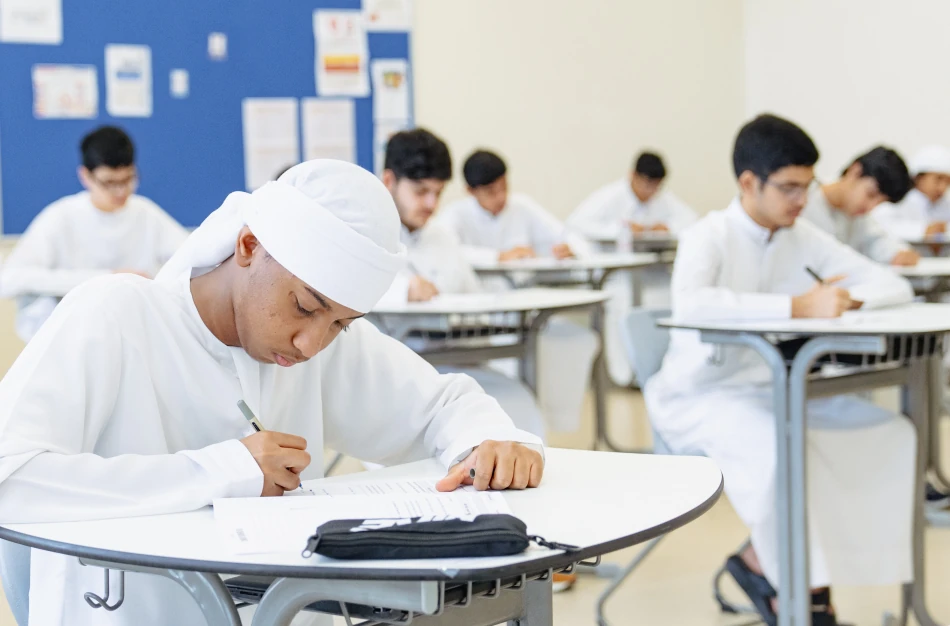
Students in Grades 7-12 Sit for Third-Term Exams Tomorrow in Continuing Education
UAE's Digital Education Evolution: Mandatory In-Person Electronic Exams Signal Hybrid Learning's Future
The United Arab Emirates is pioneering a unique approach to educational assessment as students in grades 7-12 within the integrated continuous education system begin their third-term examinations. Starting tomorrow, these students will take electronic exams while maintaining mandatory physical attendance at school premises during evening hours (6-8 PM), representing a sophisticated blend of digital innovation and traditional oversight that could reshape how nations approach educational evaluation in the post-pandemic era.
The Hybrid Model: Best of Both Worlds
The UAE's Ministry of Education has crafted what appears to be a response to lessons learned during the COVID-19 pandemic's forced digital transition. Unlike purely online assessments that raised concerns about academic integrity, or traditional paper-based exams that lack modern flexibility, this hybrid approach maintains the security of supervised testing while leveraging digital tools' advantages.
Students must arrive 30 minutes before their scheduled exam time to receive test cards and review timetables. The ministry enforces a strict 15-minute grace period—late arrivals are denied entry, ensuring disciplined examination conditions. However, once inside, students enjoy unprecedented flexibility: no time limits per question, opportunities to review and modify answers before final submission, and permission to leave only after completing at least one hour of testing.
Global Context: UAE's Educational Innovation Leadership
This examination format positions the UAE alongside other forward-thinking educational systems while maintaining its unique characteristics. Singapore has experimented with digital assessments but typically in fully controlled environments, while several U.S. states have moved to computer-based standardized testing without the evening scheduling component that the UAE employs.
The evening examination schedule (6-8 PM) is particularly noteworthy, as it accommodates the integrated continuous education system's non-traditional learners—often working adults or those with daytime commitments. This flexibility demonstrates how the UAE is adapting its educational infrastructure to serve diverse populations rather than forcing students into rigid traditional frameworks.
Implementation Strategy and Student Impact
The examination schedule reveals careful planning and resource allocation. Grade 12 students begin Monday, September 15, with Physics, followed by Social Studies (Tuesday), Arabic Language (Wednesday), and Islamic Education (Thursday). After a weekend break, they resume with English (Monday, September 22), Mathematics (Tuesday), and conclude with Biology or Chemistry (Wednesday, September 24).
This staggered approach likely serves multiple purposes: preventing system overload, allowing technical support teams to address issues between subjects, and providing students with adequate preparation time between major examinations.
Broader Implications for Educational Technology
The UAE's model addresses several critical challenges facing educational systems globally. By requiring physical presence while conducting digital assessments, the ministry tackles academic integrity concerns that have plagued remote learning. Simultaneously, the digital format allows for more sophisticated question types, immediate technical support, and potentially faster result processing.
This approach could prove particularly valuable for other nations seeking to modernize their educational assessment systems without sacrificing oversight. The model demonstrates that technological advancement in education doesn't require abandoning all traditional elements—rather, strategic integration can enhance both security and student experience.
For educational technology companies and policymakers worldwide, the UAE's hybrid examination system represents a pragmatic solution to digital transformation challenges, potentially influencing how other nations approach the delicate balance between innovation and academic integrity in their own educational reforms.
Most Viewed News

 Sara Khaled
Sara Khaled






